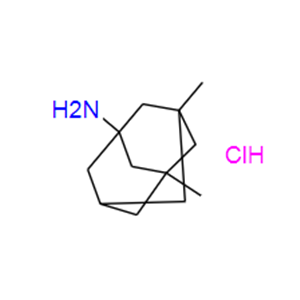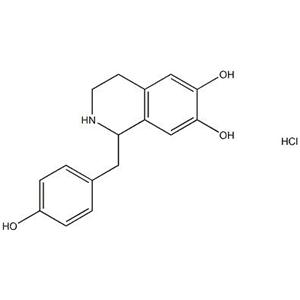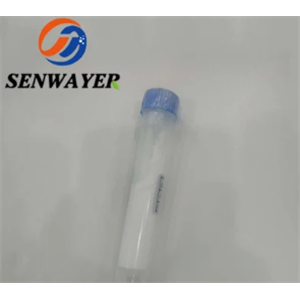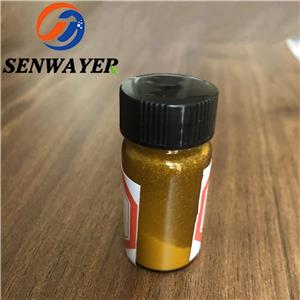
Memantine HCl
| Price | $580 |
| Package | 1KG |
| Min. Order: | 1KG |
| Supply Ability: | 20 TONS |
| Update Time: | 2024-09-25 |
Product Details
| Product Name: Memantine HCl | CAS No.: 41100-52-1 |
| EC-No.: 255-219-6 | Min. Order: 1KG |
| Purity: 99% min | Supply Ability: 20 TONS |
| Release date: 2024/09/25 |
Product name: Memantine HCl
CAS No.: 41100-52-1
Molecular formula: C12H22ClN
Molecular weight: 215.76
Melting point: 292 °C
Memantine hydrochloride is a dementia treatment drug developed by the German company Merz. It is a new, low-to-moderate affinity, voltage-dependent, non-competitive N-methyl-D-aspartate (NMDA) receptor antagonist. It can block NMDA receptors non-competitively, reduce the excessive excitement of NMDA receptors caused by glutamate, prevent cell apoptosis, and improve memory. It is a new generation of drugs to improve cognitive function. In February 2002, the European Patent Medicines Committee (CPMP) approved it for the treatment of patients with moderate and severe Alzheimer’s disease. It was launched in Germany in August of the same year and was approved by the U.S. Food and Drug Administration on October 17, 2003 ( FDA) approved for the treatment of patients with moderate to severe Alzheimer's disease. Further studies have shown that memantine hydrochloride is also effective for patients with mild to moderate Alzheimer's disease. Alzheimer's disease (Alzheimerdisease, AD), also known as senile dementia, is one of the common diseases of the elderly, mainly manifested as memory loss and recognition impairment, etc., is a progressive neurodegenerative disease. Currently, cholinesterase inhibitors (donepezil, rivastigmine, galantamine) and memantine hydrochloride are approved for the treatment of Alzheimer's disease.
Application
1. Dementia treatment drugs
The US FDA approved in October 2003 as the only treatment for severe Alzheimer's disease. It is well tolerated and has a significant effect on severe Alzheimer's disease.
2. Combined use with Huperzine A
Huperzine A is a medicine extracted from the traditional Chinese medicine Huperzia serrata. It is a reversible competitive cholinesterase inhibitor. Memantine has different binding abilities to different glutamate receptor subtypes or ion channels, reducing the excitotoxic effects of glutamate, thereby treating AD. AD patients not only have a variety of neurotransmitter changes, but also have abnormal postsynaptic receptors, so the use of cholinesterase inhibitors and glutamate receptor inhibitors can have a synergistic effect.
3. Combined use with donepezil
Donepezil is a second-generation cholinesterase inhibitor with higher selectivity for central nervous system cholinesterase, longer half-life, and lower toxicity than Huperzine A. Donepezil and Huperzine A act on different nerve conduction systems. When the two are used in combination, they can produce a synergistic effect, thereby enhancing the efficacy. Although the specific mechanism of action has not yet been discovered, it has been proven that patients with moderate to severe AD will have better therapeutic effects when treated with memantine hydrochloride combined with other drugs.
4. Combined use with nimodipine
Nimodipine is a dihydropyridine Ca2+ antagonist. It can act on nerve cells, cerebrovascular cells and glial cells of the central nervous system, and can significantly expand the diameter of cerebral blood vessels and meningeal blood vessels, which can delay the recognition of patients to a certain extent. Know the decline. When nimodipine is used in combination with memantine hydrochloride, its different pharmacological action links and mechanism of action can complement each other's advantages, thereby producing better curative effects.
5. Combined use with ginkgo biloba
The main components of Ginkgo biloba are flavonoids and nightshade lactone compounds, which have antithrombotic, anticoagulant, anti-platelet aggregation, anti-oxidation and lipid-regulating effects, improve blood vessel wall permeability and reduce brain damage, and protect brain microvascular smooth muscle cells. It has obvious protective effect on "vascular damage". The role of vascular factors in the pathogenesis of AD is gradually being valued. A large number of epidemiological, clinical and basic studies have shown that many risk factors related to vascular factors or hemodynamics can increase the risk of AD. Therefore, the combination of memantine hydrochloride acting on NMDA receptors and ginkgo biloba can play a synergistic effect.
Company Profile Introduction
You may like
Recommended supplier
| Product name | Price | Suppliers | Update time | |
|---|---|---|---|---|
| $50.00/500mg |
VIP3Y
|
TargetMol Chemicals Inc.
|
2024-11-19 | |
| $50.00/500mg |
VIP5Y
|
TargetMol Chemicals Inc.
|
2024-11-19 | |
| $0.00/1kg |
VIP1Y
|
Cangzhou Kangrui Pharma Tech Co. Ltd.,
|
2024-11-19 | |
| $0.00/1KG |
VIP4Y
|
Hebei Chuanghai Biotechnology Co,.LTD
|
2024-08-20 | |
| $10.00/1kg |
Ouhuang Engineering Materials (Hubei) Co., Ltd
|
2024-04-28 | ||
| $0.00/1KG |
VIP1Y
|
Shanghai Affida new material science and technology center
|
2024-04-25 | |
| $1.00/1g |
VIP4Y
|
Dorne Chemical Technology co. LTD
|
2024-04-03 | |
| $30.00/1KG |
Firsky International Trade (Wuhan) Co., Ltd
|
2023-10-10 | ||
| $100.00/1bag |
Hebei Fengqiang Trading Co., LTD
|
2023-08-29 | ||
| $9.00/1KG |
Wuhan Boyuan Import & Export Co., LTD
|
2023-07-18 |
- Since: 2022-10-21
- Address: Wanda global centur, Wuhan China
+86-13627115097
market02@senwayer.com







 China
China